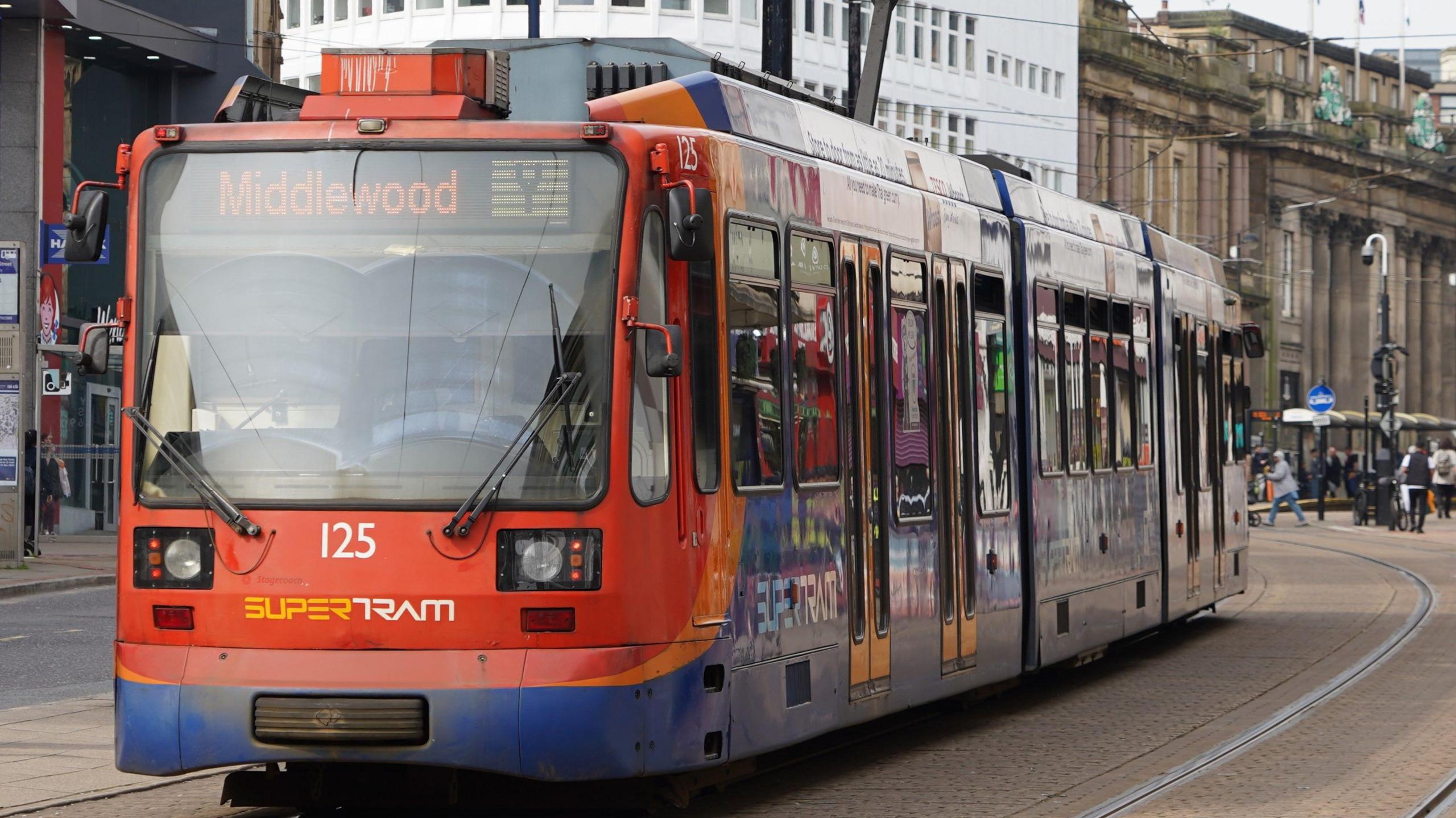Chancellor announces £15bn for transport projects

- Published
Billions of pounds of investment in transport infrastructure in England have been announced by Chancellor Rachel Reeves.
The money will be spent on tram, train and bus projects in mayoral authorities across the Midlands, the North and the West Country.
The move comes before the government's spending review next week, which will determine how much money each Whitehall department gets over the next three to four years.
Reeves has been under pressure from Labour MPs to spend money following criticism of relentless economic gloom, particularly concerning disability and benefit cuts.
Trams form the backbone of the investment plans, with Greater Manchester getting £2.5bn to extend its network to Stockport and add stops in Bury, Manchester and Oldham, and the West Midlands getting £2.4bn to extend services from Birmingham city centre to the new sports quarter.
There will also be £2.1bn to start building the West Yorkshire Mass Transit programme by 2028, and build new bus stations in Bradford and Wakefield.
Six more metro mayors will receive transport investments:
£1.5bn for South Yorkshire to renew the tram network as well as bus services across Sheffield, Doncaster and Rotherham by 2027
£1.6bn for Liverpool city region with faster connections to Liverpool John Lennon Airport, Everton stadium and Anfield, and a new bus fleet in St Helens and the Wirral next year
£1.8bn for the North East to extend the Newcastle to Sunderland Metro via Washington
£800m for West of England to improve rail infrastructure, provide more frequent trains between the Brabazon industrial estate in Bristol and the city centre, and develop mass transit between Bristol, Bath, South Gloucestershire and North Somerset
£1bn for Tees Valley including a £60m platform extension programme for Middlesbrough station
£2bn for the East Midlands to improve road, rail and bus connections between Derby and Nottingham.
The transport investment marks Reeves' first open move away from the stringent rules in the Treasury's Green Book, external, which is used by officials to calculate the value for money of major projects.
The book has been criticised for favouring London and the south-east.
In a speech in Greater Manchester, the chancellor said that sticking to book's rules has meant "growth created in too few places, felt by too few people and wide gaps between regions, and between our cities and towns".
Changing the rules will also mean more money for areas of the North and Midlands, including the so-called "Red Wall", where Labour MPs face an electoral challenge from Reform UK.
IFS says tough public spending choices unavoidable
- Published1 June
Reeves is not the first chancellor to review the Treasury's investment rules; former Prime Minister Rishi Sunak also reviewed the book as part of the Conservatives' Levelling up agenda.
Sunak had also announced some of these same projects, including the development of a mass transit network in West Yorkshire, in his Network North plan, intended to compensate for the decision to scrap the HS2 line north of Birmingham.
Labour reviewed these projects when they came to power in July, arguing they had not been fully funded.
Conservative shadow Treasury minister Gareth Davies accused Labour of copying and pasting announcements made by the Conservative government".
Conservative mayor of Tees Valley Ben Houchen said Labour's decision meant projects in his area had been delayed by a year which was "frustrating" but added that he was "absolutely delighted" the funding had now been given the go ahead.
North East Mayor Kim McGuinness said the £1.8bn funding for her area was a "game changer", while Liverpool City Region Mayor Steve Rotheram said the investment was a "massive vote of confidence in our region".
Liberal Democrat Treasury spokeswoman Daisy Cooper warned the chancellor must now deliver, because "these communities have heard these same promises before, only to be left with phantom transport networks".
She added: "Extra investment in public transport must also focus on cutting fares for hard-pressed families being clobbered by a cost of living crisis."
Zoe Billingham, head of the IPPR North think tank, welcomed the investment but said that while money had been provided to lay the tracks there was "still a question about the ongoing running costs" and the extent to which the new transport networks would pay for themselves.
Following the speech Reeves was asked if there would be funding for a new rail link between Manchester and Liverpool.
She replied that there would be "more to come next week" when she delivers her Spending Review.
Reeves' £15.6bn regional transport announcements are part of a five-year funding allocation from 2027/28 to 2031/32, which a Treasury spokesman confirmed would double the current £1.14bn spending allocation for 2024-25 to £2.9bn by 2029-30.

Sign up for our Politics Essential newsletter to read top political analysis, gain insight from across the UK and stay up to speed with the big moments. It'll be delivered straight to your inbox every weekday.